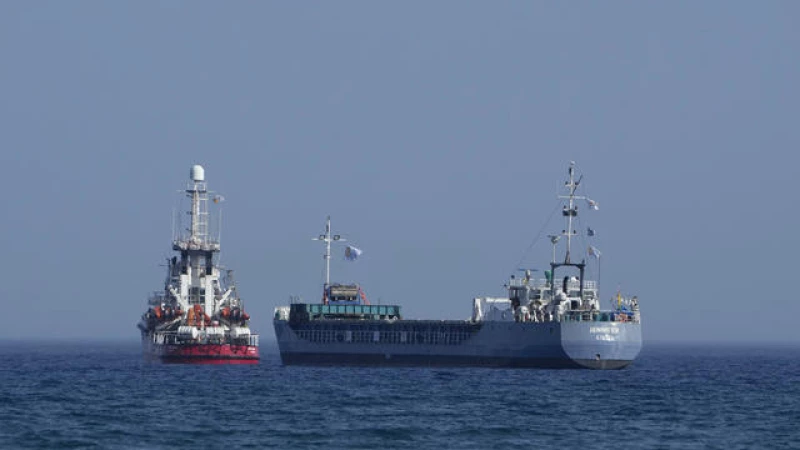Setting sail from a port in Cyprus over the weekend, a convoy of three ships embarked on a mission to deliver 400 tons of food and supplies to Gaza, where concerns over hunger have reached critical levels.
Organized by World Central Kitchen, the convoy, including a barge, is loaded with approximately 300 tons of ready-to-eat provisions such as rice, pasta, flour, legumes, canned vegetables, and proteins, capable of preparing more than 1 million meals. The shipment also includes dates, a staple for breaking the fast during Ramadan.
Earlier this year, World Central Kitchen, under the leadership of celebrity chef José Andrés, sent 200 tons of food, water, and aid to Gaza through an Open Arms vessel. This marked the first food delivery by sea since the conflict began.
The United Nations and its partners have issued warnings about the looming threat of famine in the devastated and isolated northern region of Gaza, potentially as soon as this month. Reports indicate that around 1.7 million individuals in Gaza have been displaced, lacking access to essential resources like food, water, medicine, and adequate shelter.
World Central Kitchen informed CBS News that over 37 million meals have been dispatched to the territory since October 7, following a terror attack in Israel that initiated the conflict. The organization has established more than 60 community kitchens in the area and has conducted meal airdrops as well as food deliveries to displaced families in Lebanon due to the ongoing conflict.
Despite these efforts, humanitarian officials emphasize that deliveries by sea and air are insufficient, urging Israel to permit more aid to be transported by road. The highest U.N. court has mandated Israel to open additional land crossings and implement other measures to alleviate the humanitarian crisis.
On another front, the United States has expressed approval for the establishment of a new Palestinian autonomy government, indicating its recognition of the revised Cabinet lineup as a move towards political reform.
The Biden administration advocates for the "revitalization" of the West Bank-based Palestinian Authority with the expectation that it can also govern the Gaza Strip post the Israel-Hamas conflict. The Palestinian Authority, led by President Mahmoud Abbas, appointed U.S.-educated economist Mohammad Mustafa as prime minister earlier this month.
However, both Israel and Hamas are opposed to the idea of the Palestinian Authority governing Gaza, with Hamas deeming the new government formation as invalid. The authority faces challenges in garnering popular support or legitimacy among Palestinians due to its security collaboration with Israel in the West Bank.
The conflict erupted following an incursion by Hamas-led militants into southern Israel on October 7, resulting in the deaths of approximately 1,200 individuals, predominantly civilians, and the capture of around 250 others.
Over 400 Palestinians Killed in Recent Violence
Recent reports from local health authorities indicate that more than 400 Palestinians have lost their lives in the West Bank and east Jerusalem due to actions by Israeli forces or settlers since October 7. Dr. Fawaz Hamad, the director of Al-Razi Hospital in Jenin, mentioned in an interview with Awda TV that a 13-year-old boy was killed by Israeli forces in Qabatiya. The incident is currently under review by the Israeli military.
One of the pressing issues facing Gaza now is the task of reconstruction. The region has suffered significant damage over the past six months of conflict, with critical infrastructure such as hospitals, schools, homes, roads, sewage systems, and the electrical grid being destroyed.
According to local health authorities, airstrikes and a ground offensive by Israel have resulted in 32,705 Palestinian fatalities. In the last 24 hours alone, 82 bodies were brought to hospitals. While Gaza's Health Ministry does not differentiate between civilians and combatants in its death toll, it has noted that a majority of those killed are women and children.
Israel has claimed that more than a third of the deceased are militants, but has not provided evidence to support this assertion. The country also attributes civilian casualties to Hamas, citing the group's presence in residential areas.
The conflict has led to the displacement of over 80% of Gaza's population and has pushed hundreds of thousands to the brink of famine, according to the United Nations and international aid organizations. Despite the United Nations Security Council's recent call for a cease-fire, Israel's military has continued to target numerous locations in Gaza.
During an airdrop on Friday, the U.S. military announced that it had delivered over 100,000 pounds of aid to Gaza, with a total of almost a million pounds distributed as part of a collaborative effort among multiple countries.
Following the conflict, Israel has stated its intention to maintain indefinite security control over Gaza and collaborate with non-affiliated Palestinians, excluding those associated with the Palestinian Authority or Hamas. The willingness of individuals in Gaza to assume such a role remains uncertain.
Hamas has issued a warning to Gazans, cautioning against cooperating with Israel in governing the territory. They have threatened to treat any collaborators as enemies, implying a risk to their lives. Instead, Hamas advocates for the formation of a unity government comprising all Palestinian factions in preparation for long-overdue national elections, which have not been held for 18 years.







